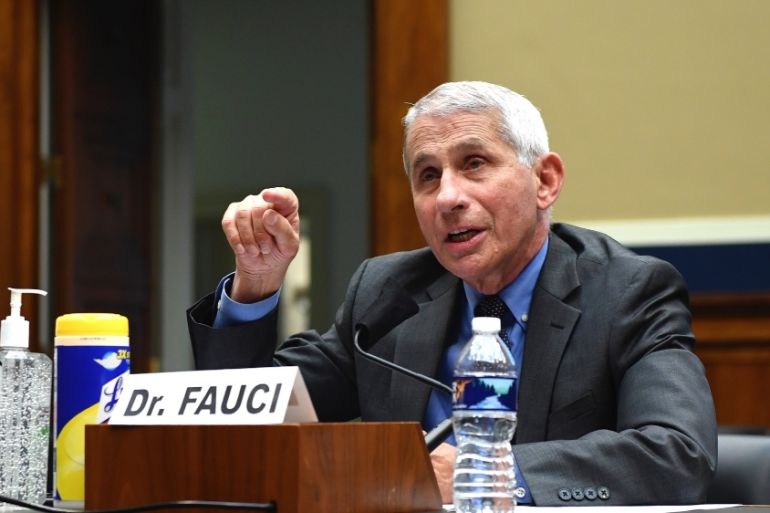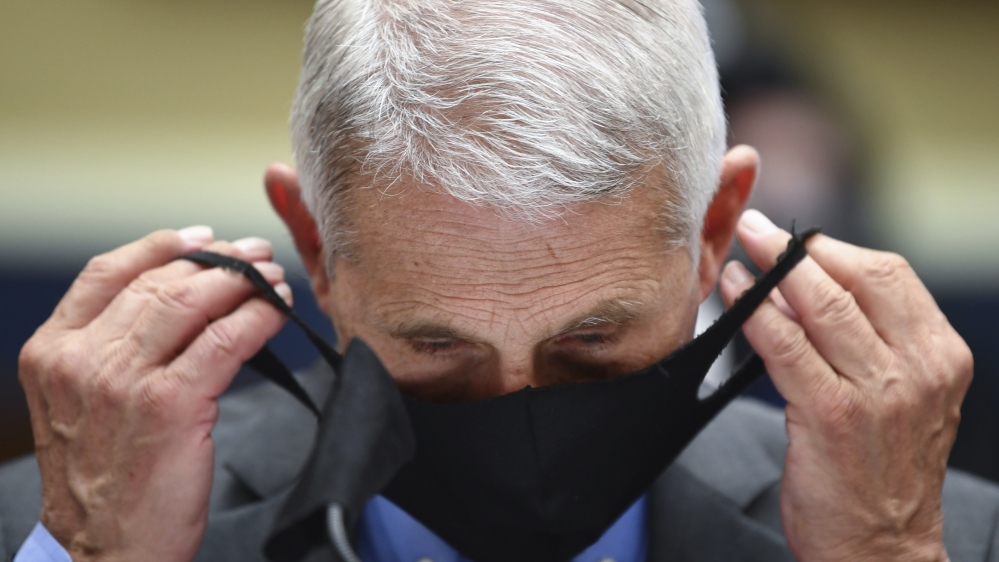‘We’ve been hit badly’, Fauci warns of US coronavirus surge
Dr Anthony Fauci said coming weeks ‘critical’ to address rising number of cases across half of US states.

Dr Anthony Fauci has told a House committee there could be a COVID-19 vaccine later this year or early in 2021, but warned that the next few weeks will be critical to tamping down coronavirus hot spots around the country.
Fauci and other top health officials also said they have not been asked to slow down testing for coronavirus, a controversial issue after President Donald Trump said last weekend he had asked them to do just that because it was uncovering too many infections. Trump said earlier in the day that he was not kidding.
Keep reading
list of 4 itemsMexico’s teachers seek relief from pandemic-era spike in school robberies
‘A bad chapter’: Tracing the origins of Ecuador’s rise in gang violence
Why is the US economy so resilient?
“We will be doing more testing,” Fauci, the government’s top infectious disease expert, told a House committee on Tuesday.
Fauci is testifying before a House committee – along with the heads of the Centers for Disease Control and Prevention, the Food and Drug Administration, and a top official at the Department of Health and Human Services.

“We’ve been hit badly,” Fauci said. He said he was “really quite concerned” about rising community spread in some states, including Arizona, which Trump was visiting on Tuesday to view the construction of a border wall and for a rally at a megachurch.
“The next couple of weeks are going to be critical in our ability to address those surges,” Fauci said.
Since Fauci’s last appearance at a high-profile hearing more than a month ago, the United States is emerging from weeks of stay-at-home orders and business shutdowns.
Reopening businesses and loosening restrictions have been done in an uneven way, with some states far less cautious than others. A trio of states with Republican governors who are bullish on reopening – Arizona, Florida and Texas – are among those seeing worrisome increases in cases.
Steep increases
Twenty-five US states reported more new cases last week than the previous week, including 10 states that saw weekly new infections rise more than 50 percent, and 12 states that posted new records, according to the analysis of data from The COVID Tracking Project, a volunteer-run effort to track the outbreak.
Texas reported one of the largest rises in new cases at 24,000 for the week ended June 21, an increase of 84 percent from the previous week. The number of COVID-19 tests that came back positive in the state rose from 7 to 10 percent.
New cases in Florida rose 87 percent last week to almost 22,000, with the state’s positive test rate nearly doubling to 11 percent.
Arizona reported 17,000 new cases, a 90 percent increase, with 20 percent of tests coming back positive, according to the analysis.
Cases are going up in the U.S. because we are testing far more than any other country, and ever expanding. With smaller testing we would show fewer cases!
— Donald J. Trump (@realDonaldTrump) June 23, 2020
The governors of all three states have attributed the increases in new cases to more testing, and to younger residents not following social distancing guidelines.
Last week, Vice President Mike Pence published an opinion article in The Wall Street Journal saying the administration’s efforts have strengthened the nation’s ability to counter the virus and should be “a cause for celebration”.

Then, at his weekend rally in Tulsa, President Trump called for slower testing rates. White House officials later tried to walk back Trump’s comment, suggesting it was not meant to be taken literally.
Fauci has recently warned that the US is still in its first wave of the pandemic, and he has continued to urge the American public to practice social distancing. And, in a recent ABC News interview, he said political demonstrations such as protests against racial injustice are “risky” to all involved.
Asked if that applied to Trump rallies, he said it did. Fauci continues to recognise widespread testing as critical for catching clusters of COVID-19 cases before they turn into full outbreaks in a given community.
Fauci remains optimistic
About 2.3 million in the US have been infected in the pandemic, and more than 120,000 have died, according to data from Johns Hopkins University.
As head of the National Institute of Allergy and Infectious Diseases, Fauci will be joined before the House Committee on Energy and Commerce by CDC Director Dr Robert Redfield, FDA chief Dr Stephen Hahn and the head of the US Public Health Service, Admiral Brett Giroir.
|
|
Giroir was tapped by the White House to oversee the expansion of coronavirus testing. But he gained notoriety after a whistle-blower complaint flagged him for trying to push a malaria drug touted by Trump to treat COVID-19 without conclusive scientific evidence.
The FDA has since withdrawn its emergency use authorisation for hydroxychloroquine.
“There have been a lot of unfortunate missteps in the Trump administration’s response to the COVID-19 pandemic,” said House Committee on Energy and Commerce Chairman Frank Pallone of New Jersey.
“As communities across the country ease social distancing guidance and reopen their economies, it is critically important that both the administration and Congress remain focused on containing the spread of the coronavirus and providing the resources and support Americans need during this time of crisis,” Pallone said.
There is still no vaccine for COVID-19, and there are no treatments specifically developed for the disease, although the antiviral drug remdesivir has been shown to help some patients, as well as a steroid called dexamethasone, and plasma from patients who have recovered.
Since Fauci last testified, hospital physicians have become more skilled at treating coronavirus patients with the techniques and medications at their disposal.
The US continues to ramp up testing, with some 27.5 million citizens, or more than 8 percent of the population, tested thus far.
But most communities still lack enough health workers trained in doing contact tracing, the work of identifying people who have in recent weeks had interactions with an infected person. That could make it more difficult to tamp down emerging outbreaks.
The House Energy and Commerce panel has oversight over drugs and vaccines, among other facets of the US healthcare system. Committee Democrats have been harshly critical of the administration. However, not all Republicans have lined up to defend the White House. Some GOP members were growing concerned early in the year that the administration was not doing enough to prepare.